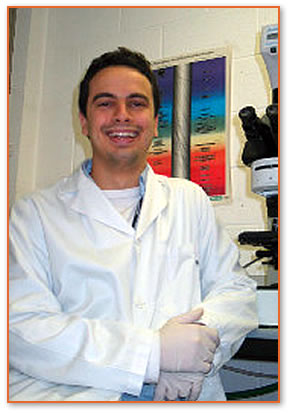Jerome Staal 
What interested you as a child?
As a very young child I always wanted to be a Veterinarian, because I loved working with animals. I would always try to rescue injured (and maybe uninjured too) animals and nurse them to health. Despite my enthusiasm, I was never very good at taking care of sick animals because I always got bored and wanted to do something new and exciting. This and my highly inquisitive mind (annoyingly for my mother) led me to Science, where we can constantly explore and answer questions. What I loved about Science is the fact that with every question you answer, you create another hundred questions.
What did you study at University?
I immediately knew that I wanted to do a Science degree when I went to University. In the first year I took the widest range of subjects possible including Botany, Zoology, Chemistry, and Human Biology. Sadly, I had to cut down to only a few subjects. I was very interested in the way the human body works and more interestingly how secret codes within our genome could determine what happens to us. In my final year I did Neuroscience, which was the most exciting subject of all. It was interesting to learn how the brain dictates everything we do, yet it cannot regenerate following injury.
What is your current Research/Career?
I am currently doing a PhD at the Royal Hobart Hospital Clinical School. I am interested in what happens to the brain following injury. A brain injury can often be difficult to detect because the cells of the brain (neurons) can often die over a long period of time. I am trying to understand the way and speed these neurons die following injury. We have also been testing new drugs that may stop the cells from degenerating and even promote the cell to recover. This is important because the neurons in the brain do not regenerate once they die, so any damage to the brain is permanent.
What are your aspirations?
My project has been very interesting so far. I hope to maybe continue this line of research after I complete my PhD. I plan to possibly move overseas once finished to learn new techniques and gain valuable experience. I hope to return to Tasmania after a couple of years with a lot more new ideas and techniques, which will be useful here. I guess my major aspiration is to find or help find a way to treat brain injuries and neurodegenerative diseases, which are the leading causes of death and disability in the western world.
What do you love about Science?
I love the fact that we are always learning something new, so you can never get bored. Science is the only subject that encourages you to ask questions, and if you lucky, you may even find a few very important answers. It is also a very rewarding career because there is no better pleasure in the world than helping someone who is suffering.




